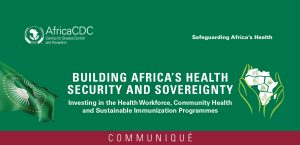Windhoek, 24 June 2024 – The Namibian government, in partnership with Africa CDC, officially launched a Tripartite One Health National Strategy 2024–2028 on 19 June 2024. This signifies the country’sONE commitment to address shared health threats between animals, humans, and the environment.
The Ministries of Health and Social Services, Environment, Forestry and Tourism, Agriculture, Water and Land Reform developed the strategy in close collaboration with the University of Namibia, the United Nations Foods and Agriculture Organization (FAO), and the World Health Organization (WHO).
Officiating the event, the Minister of Health and Social Services, Dr Kalumbi Shangula, stated that in the “Namibian context, the need for the One Health approach is evidenced by the frequently reported outbreaks of zoonotic disease, coupled with the effects of climate change.”
The One Health approach is crucial because “75% of emerging pathogens that are known to cause epidemics affecting humans are of zoonotic origin”, said Shangula.
The Tripartite One Health Strategic Plan is based on the vision of a nation that promotes healthy ecosystems to minimise the risks and impacts of emerging and re-emerging health threats at the human, animal, plant, and environment interface. Its main goal is to establish and institutionalise a sustainable One Health Approach across all sectors in Namibia, starting at the community level.
Africa CDC remains committed to strengthening national One Health capacities across the continent, said Dr Yewande Alimi, One Health Unit Lead at Africa CDC.
“We applaud the strong political commitment by the Ministers of Health and Social Services, Environment, Forestry and Tourism, and Agriculture, Water and Land Reform as they launched this national strategy to strengthen One Health in Namibia,” said Dr Alimi.
Representing the United Nations quadripartite on the One Health Approach, the WHO Country Representative, Dr Richard Banda, expressed appreciation for witnessing “actions being taken in Namibia to enhance the One Health activities in the country as per national framework and the International Health Regulations 2005.” Dr Banda said this indicates Namibia’s dedication to “strengthen the country’s capacity to prepare for, detect and respond” to public health emergencies and threats to health consequences.
The Namibian One Health National Strategy is anchored on six thematic areas, which include enhancing One Health’s capacities to strengthen health systems; reducing the risks from emerging and re-emerging zoonotic epidemics and pandemics; controlling and eliminating zoonotic, neglected tropical and vector-borne diseases; strengthening the assessment, management and communication of food safety risks; curbing the silent pandemic of Antimicrobial Resistance; and integrating the Environment in One Health.
Dr Kalumbi informed attendants that the implementation of the Tripartite One Health National Strategy “will be reviewed annually by the One Health Multisectoral Coordinating Committee, and its activities will be integrated into the implementation of existing strategies such as National Action Plan for Health Security; the Integrated Disease Surveillance and Response; the Control of Neglected Tropical Diseases; Event-Based Surveillance; Antimicrobial Resistance; as well as Veterinary and Wildlife disease control interventions.”
The National One Health Strategy outlines a comprehensive action plan with clear goals, milestones, and a dedicated implementation framework. The Ministry of Health and Social Services, along with its partners, will work diligently to ensure the successful execution of this strategy.
##
Read more on One Health: https://africacdc.org/download/framework-for-one-health-practice-in-national-public-health-institutes/
About Africa CDC: The Africa Centres for Disease Control and Prevention (Africa CDC) is the continental autonomous Health agency of the African Union that strengthens the capacity and capability of Africa’s public health institutions as well as partnerships to detect and respond quickly and effectively to disease threats and outbreaks, based on data-driven interventions and programmes. Learn more at: https://africacdc.org
Media contact:
Margaret Edwin, Director of Communication & Public Information Division: Africa CDC | Tel: +251 986 632 878 | Email: EdwinM@africacdc.org







